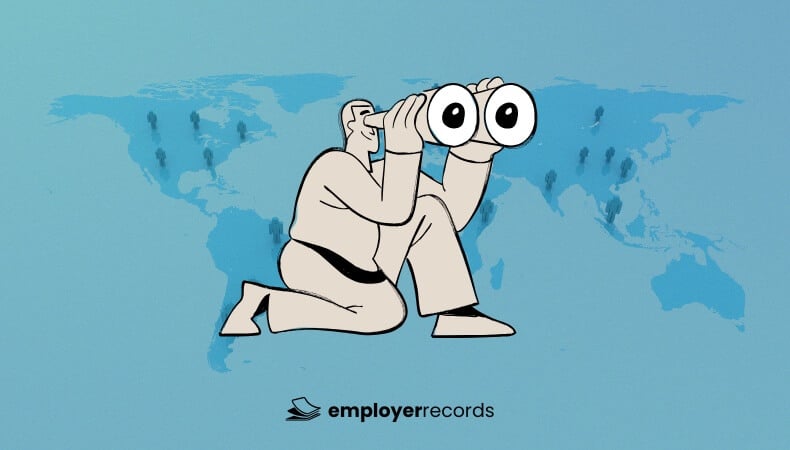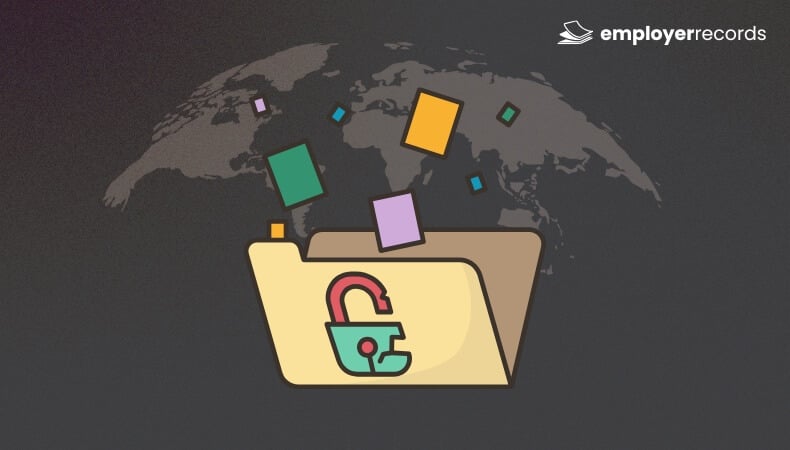Expanding your business into international markets presents a wealth of opportunities, from accessing diverse talent pools to tapping into new customer bases.
However, the journey is often fraught with complexities, navigating foreign labor laws, establishing local entities, managing international payrolls, and ensuring compliance with varying regulations can be overwhelming. These challenges can divert focus from core business objectives and impede swift market entry.
This is where an Employer of Record (EOR) becomes invaluable. An EOR acts as a legal employer on your behalf in foreign jurisdictions, handling all employment-related responsibilities, including compliance, payroll, benefits, and tax obligations.
By partnering with an EOR, businesses can swiftly and compliantly hire international talent without the need to establish a local entity, thereby accelerating global expansion and reducing administrative burdens.
In this article, we’ll delve into how EORs streamline global recruitment, mitigate risks, and empower businesses to focus on growth and innovation.
What Is An Employer Of Record (EOR)?
An Employer of Record (EOR) is a third-party organization that assumes the legal responsibility of employing workers on behalf of another company. This arrangement allows businesses to hire talent in different regions without establishing a local entity.
The EOR manages critical employment tasks, including payroll processing, tax withholding and remittance, benefits administration, and ensuring compliance with local labor laws.
While the EOR handles these administrative and legal obligations, the client company retains control over the employees’ day-to-day activities and work assignments. This model simplifies international hiring, mitigates compliance risks, and accelerates global expansion efforts.
| Global Expansion Challenge | Business Impact (Without EOR) | EOR-Based Solution |
|---|---|---|
| Labor Law Complexity | Risk of misclassification, fines, lawsuits | ✅ Local compliance and classification handled |
| Entity Setup Requirements | 3–6 months setup time, legal fees, overhead | ✅ EOR already has legal entities in-country |
| International Payroll & Taxes | Currency issues, errors, late payments, penalties | ✅ Full payroll, tax, and benefits administration |
| Limited Global Reach | Delayed hiring, HR/legal learning curve | ✅ Immediate access to talent in 100+ countries |
How EORs Simplify Global Recruitment
Navigating the complexities of international hiring can be a formidable challenge for businesses aiming to expand globally. From understanding diverse labor laws to managing payroll across different currencies, the administrative and legal hurdles are significant.
An Employer of Record (EOR) offers a strategic solution by assuming the legal responsibilities of employment in foreign markets. This partnership enables companies to onboard international talent swiftly and compliantly, without the need to establish a local entity.
By handling critical functions such as payroll processing, tax compliance, benefits administration, and adherence to local labor regulations, EORs alleviate the burdens associated with global recruitment.
This allows businesses to focus on their core operations and strategic growth initiatives, confident that their international workforce is managed effectively and in full compliance with local laws.

01. Accelerated Market Entry
By embracing an Employer of Record, companies unlock a streamlined path to global recruitment that sidesteps the pitfalls of setting up multiple legal entities.
An EOR takes on the full spectrum of employment responsibilities—from local payroll and tax filings to benefits administration and regulatory reporting—so your internal team can remain laser‑focused on strategic initiatives.
This partnership not only mitigates the risk of misclassification and fines but also accelerates time‑to‑hire by removing administrative bottlenecks.
Ultimately, working with a reputable EOR provider empowers businesses to scale swiftly and compliantly across borders, tapping into new talent pools and markets without the steep learning curve of foreign labor laws. This increases the bandwidth for innovation, stronger global teams, and sustainable growth.
02. Compliance Assurance
Navigating the intricate landscape of international labor laws poses significant challenges for companies expanding globally. Each country has its own set of employment regulations, tax codes, and classification standards, making compliance a complex endeavor.
Misclassifying employees as independent contractors can lead to severe consequences, including substantial fines, back taxes, legal disputes, and reputational damage.
Employer of Record (EOR) services play a pivotal role in mitigating these risks. By serving as the legal employer, an EOR assumes responsibility for adhering to local labor laws, managing payroll, handling tax withholdings, and administering benefits.
They ensure that employment contracts are compliant with regional regulations and that workers are correctly classified, thereby reducing the likelihood of legal infractions.
Partnering with an EOR allows businesses to focus on their core operations while entrusting complex compliance matters to experts.
This strategic collaboration not only safeguards against potential legal pitfalls but also facilitates smoother international expansion by ensuring that employment practices align with local standards.
03. Comprehensive HR and Payroll Management
An Employer of Record (EOR) streamlines cross-border HR operations by managing essential administrative tasks, ensuring consistency and compliance across international teams.
They handle payroll processing, tax filings, benefits administration, and employee onboarding, allowing businesses to focus on core activities. EORs ensure accurate and timely salary payments in local currencies, manage statutory deductions, and administer region-specific benefits, such as health insurance and retirement plans.
By overseeing these functions, EORs help maintain uniform HR practices across different countries, reducing administrative burdens and mitigating compliance risks.
This centralized approach enables companies to efficiently manage a global workforce without establishing local entities, facilitating seamless international expansion.
04. Talent Acquisition And Retention
Attracting and retaining top talent is paramount in today’s competitive global job market. Employer of Record (EOR) services empower companies to access a diverse international talent pool without the complexities of establishing local entities.
By managing compliance, payroll, and benefits administration, EORs enable businesses to offer competitive compensation packages tailored to local markets, enhancing their appeal to prospective employees.
Moreover, EORs streamline onboarding processes and ensure adherence to regional labor laws, fostering a positive employee experience from the outset. T
his comprehensive support not only simplifies global hiring but also contributes to higher employee satisfaction and loyalty, reducing turnover rates. By leveraging EOR services, companies can efficiently build and maintain a robust, engaged, and globally distributed workforce.
Key Benefits Of Using An EOR
Leveraging an Employer of Record (EOR) can be a transformative strategy for businesses aiming to expand their global footprint efficiently. By entrusting employment responsibilities to an EOR, companies can navigate the complexities of international hiring with greater ease and compliance.
- Cost Efficiency: Avoid the expenses associated with setting up and maintaining a legal entity in each country.
- Risk Mitigation: Transfer employment-related liabilities to the EOR, reducing exposure to legal and financial risks.
- Scalability: Easily scale your workforce up or down in different regions without the complexities of local employment laws.
- Focus on Core Business: Free up internal resources to concentrate on strategic initiatives while the EOR manages administrative tasks.
EOR vs. Traditional Hiring Models
Choosing between an Employer of Record (EOR) and traditional hiring methods is a pivotal decision for businesses aiming to expand globally. Each approach offers distinct advantages and challenges, influencing factors such as compliance management, operational control, and scalability.
Understanding the key differences between these models is essential to determine the best fit for your organization’s international growth strategy. The following comparison highlights the primary distinctions to assist in making an informed choice.
| Aspect | EOR Model | Traditional Hiring Model |
| Legal Entity | Not required | Required for each country |
| Compliance | Managed by EOR | Handled internally by the company |
| Payroll & Benefits | Administered by EOR | Managed internally or through local providers |
| Speed of Hiring | Rapid onboarding across borders | Slower due to legal and administrative setup |
Choosing The Right EOR Provider
Choosing the right Employer of Record (EOR) provider is critical for ensuring seamless global expansion, as it directly affects your ability to remain compliant with local labor laws, process payroll accurately, and deliver a consistent employee experience across borders.
Before making a decision, evaluate each provider’s market expertise and legal entity presence, assess pricing transparency and fee structures, and review their reputation and client support capabilities to ensure they align with your growth objectives:
- Global Reach: Ensure the EOR provider has established entities or partnerships in the countries where you plan to hire. A provider with a broad global presence can facilitate smoother onboarding and compliance across multiple jurisdictions.
- Compliance Expertise: Verify that the EOR has in-depth knowledge of local labor laws and regulations in your target markets. This expertise is crucial to navigate complex legal landscapes and avoid potential penalties.
- Technology Platform: Assess the EOR’s HR and payroll systems for usability and integration capabilities with your existing tools. A robust and user-friendly platform ensures efficient management of your international workforce.
- Reputation and Reviews: Research client testimonials, case studies, and online reviews to gauge the EOR provider’s reliability and service quality. Positive feedback from similar businesses can indicate a trustworthy and effective partnership.
Potential Challenges And Limitations
While Employers of Record (EORs) offer significant advantages in simplifying global recruitment, it’s essential to consider potential challenges that may impact your business operations.
01. Cost Implications
EOR services often come with higher fees compared to traditional direct hiring methods. These costs can include administrative fees, benefits administration, and compliance management.
For businesses with tight budgets or those hiring in multiple countries, these expenses can accumulate, potentially affecting long-term financial planning and profitability. It’s crucial to weigh these costs against the benefits of rapid market entry and compliance assurance.
02. Control Over HR Functions
Partnering with an EOR means entrusting a third party with critical HR functions, including payroll, benefits, and compliance. While this delegation can reduce administrative burdens, it may also result in a perceived loss of control over employee management.
Companies accustomed to handling HR in-house might find it challenging to align external HR practices with their internal culture and policies. Clear communication and well-defined agreements with the EOR can help mitigate these concerns.
03. Data Security Concerns
EORs handle sensitive employee data, including personal information, tax records, and compensation details. Entrusting this data to a third party necessitates robust data protection measures.
Businesses must ensure that their EOR partners comply with data protection regulations such as GDPR and implement stringent security protocols. Failure to do so can lead to data breaches, legal repercussions, and damage to the company’s reputation.
Conclusion
By outsourcing employment responsibilities to an EOR, organizations remove the administrative burden of maintaining local entities, enabling swift entry into new markets.
EORs consolidate payroll, benefits, and tax obligations under one expert provider, reducing errors and mitigating compliance risks across multiple jurisdictions. This holistic approach streamlines HR workflows, accelerates onboarding, and frees up internal teams to prioritize core business functions.
Additionally, partnering with an EOR grants access to localized expertise, ensuring that company policies align with regional labor laws and cultural nuances. Organizations can therefore deploy and manage diverse talent pools efficiently, fostering innovation and competitive advantage in global markets.
With administrative and legal responsibilities shifted, businesses can reduce operational costs associated with entity setup and maintenance.
The scalability and flexibility of EOR arrangements allow companies to adjust headcount dynamically in response to evolving market demands. Ultimately, embracing an Employer of Record empowers enterprises to focus on growth and innovation, rather than bureaucratic overhead.







